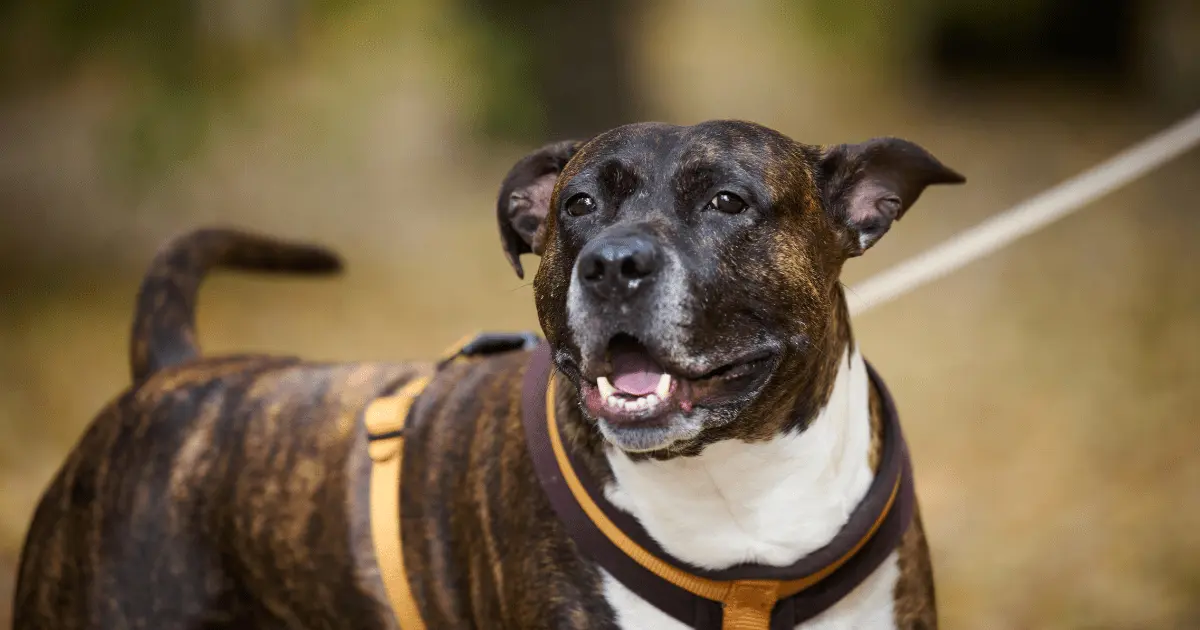When we think of dogs, we often picture those with a round chest like Corgis, Labradors, and Golden Retrievers. Their chests are typically round, resembling the shape of a circle when you look at them from the front. However, some dogs are different. They are barrel-chested or deep-chested, which means their body type is quite distinctive and robust. The broad, rounded ribcage gives them a unique build.
A barrel-chested dog has a deep chest that allows them to take in more air, which is ideal for endurance. These dogs are built for strength and are often seen in working breeds. Their robust structure and unique silhouette make them stand out in the canine world. If you’re a pet parent of a barrel-chested dog, it’s important to understand what this means for their health and physical needs.
Table of Contents
ToggleBarrel Chested Dog
When we talk about a barrel-chested dog, we’re referring to a canine with a round chest that resembles a barrel. The rib cage is deep and wide, giving it a visually chest-heavy look. This unique shape makes the dog appear more solid and substantial. The top and bottom of the chest are straight and even, while the shoulders are wider and rounded. You’ll typically find that the bottom of the chest is above or level with the front elbows, adding to its distinctive appearance.
Although the barrel-chested build is common among certain breeds, it is quite different from the deep-chested dog, which is defined by a longer chest that extends below its elbows. These dogs usually have a narrower chest, and their overall shape is more egg-like or elliptical when viewed from the front.
Interestingly, some breeds are naturally barrel-chested, while others have developed this shape over time due to their genetic bloodline. For example, Labrador Retrievers, traditionally, are not desired to have a barrel chest, according to the American Kennel Club, but some breeding lines have evolved this characteristic.
Even mixed breed dogs may inherit this build, depending on their parent breeds. Dog DNA tests can be especially helpful in determining the genetic background of your dog and understanding how it may affect their health. Some breeds with deep-chested builds, for instance, may be more prone to certain health implications, making knowledge of their bloodline vital for future care.
Dogs With Barrel Chests
Dog breeds with barrel chests typically consist of;
- Keeshonds
- Bulldog
- English Bulldog
- French Bulldog
- American Pitbull
- Pugs
- Boston Terriers
- Mastiffs
- Staffordshire Bull Terriers
- Boxers
Deep Chested Dog Breeds
Dog breeds with deep chests typically consist of:
- Dachshunds
- Rottweilers
- German Shepherds
- Great Danes
- Basset Hounds
- St. Bernards
- Bloodhounds
- Newfoundlands
- Weimaraners
- Akitas
- Irish Wolfhounds
- Dobermans
- Standard Poodles
- Irish Setters
- Gordon Setters
- Old English Sheepdogs
Health Implications For Deep-Chested Dogs
When it comes to deep-chested dog breeds, such as the barrel chested variety, the risk of bloating or GDV (Gastric Dilatation Volvulus) becomes a serious concern. The anatomy of these dogs gives them more room in the chest space, which can create an opportunity for the stomach to expand and twist. This causes air to become trapped, putting pressure on the diaphragm and vital organs, which could lead to internal bleeding, a stomach rupture, and even shock.
In extreme cases, if left untreated, bloating can be fatal. These conditions also cause the stomach to become distended, and if the dog has burped but still seems bloated, immediate action is needed. Pacing, agitated behavior, difficulty breathing, and dribbling are all signs that should send any pet parent straight to the vet because time is critical in such emergencies.
Preventing bloat in deep-chested dogs involves some proactive steps. For example, feeding them smaller amounts of food more frequently instead of larger meals can help reduce the chances of bloating. Additionally, avoid strenuous exercise before and after eating, and use specially-designed feeders if your dog tends to eat quickly, as this can help limit the amount of air they swallow.
If you have multiple pets, feeding them separately can reduce the competition that may cause them to gobble their meals too fast. A slow and steady approach to eating, paired with close attention to any signs of bloating, can help ensure your dog’s health remains stable and prevent a sudden medical crisis.
Frequently Asked Questions (FAQs)
What is barrel chested?
A barrel chested dog has a broad, rounded chest with a deep, wide rib cage, often giving the appearance of a barrel.
Are pugs barrel chested?
Yes, pugs have a barrel chested build with a deep, rounded rib cage.
How to tell if a dog is deep chested?
A deep-chested dog has a narrow, long chest with a significant depth from the shoulders to the belly, typically with a prominent ribcage.
Are cattle dogs barrel chested?
No, cattle dogs typically have a more athletic build and are not considered barrel chested.
What does “barrel chested dog” mean?
A barrel chested dog refers to a dog breed with a deep, round rib cage, resembling the shape of a barrel.
Conclusion: Understanding and Caring for Barrel-Chested Dogs
In conclusion, barrel-chested dogs possess a distinct and robust body structure, with a broad, rounded rib cage that allows for enhanced endurance and strength. Common in breeds like Bulldogs, Boxers, and Mastiffs, this build plays a significant role in their physical capabilities.
However, it also comes with potential health risks, especially the risk of bloat or gastric dilatation volvulus (GDV), which can be life-threatening if not addressed promptly. Pet owners of barrel-chested dogs should be mindful of these risks and take preventive measures, such as feeding smaller meals and avoiding strenuous activity around mealtimes, to help maintain their dog’s health and well-being.
Sources
Monique, “A Guide to Identifying Deep-Chested, Barrel-Chested, and Round-Chested Dogs,” Ayo Pets. https://ayopets.com/difference-between-deep-and-barrel-chested-dogs/
Amy Caldwell, “Key Health Concerns for Deep-Chested Dogs,” Wag Walking, Oct 21, 2021. https://wagwalking.com/wellness/health-risks-you-should-know-about-for-your-deep-chested-dog
“Understanding Dog Body Types: Barrel-Chested and Beyond,” PetMD. https://www.petmd.com/dog/general-health/understanding-dog-body-types
Related Articles




